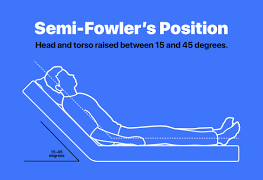The nurse finds a client on bed rest experiencing clear signs of dyspnea. The nurse should assist the client to a:
Trendelenberg position.
side-lying position.
supine position.
semi-Fowler's position.
The Correct Answer is D
Choice A rationale: The Trendelenberg position is not typically used for dyspnea; it involves placing the body in a supine position with the lower half tilted downward. Choice B rationale: The side-lying position is not typically used for dyspnea.
Choice C rationale: The supine position may worsen dyspnea, especially in individuals with respiratory distress.
Choice D rationale: The semi-Fowler's position, with the head of the bed elevated, is often used to assist with breathing and improve oxygenation in clients with dyspnea.

Nursing Test Bank
Naxlex Comprehensive Predictor Exams
Related Questions
Correct Answer is B
Explanation
Choice A rationale: Propranolol 10 mg PO twice a day would typically be given with a more extended interval between doses, not at 10:00 AM, 2:00 PM, and 6:00 PM.
Choice B rationale: Diazepam 5 mg PO three times a day would align with the specified dosing schedule of 10:00 AM, 2:00 PM, and 6:00 PM.
Choice C rationale: Cephalexin 500 mg PO q4 hours would require more frequent dosing than the specified schedule.
Choice D rationale: Morphine Sulfate 10 mg IM q4 hours prn pain is ordered every 4 hours, not at the specified times of 10:00 AM, 2:00 PM, and 6:00 PM.
Correct Answer is D
Explanation
Choice A rationale: Carbon dioxide level is not a direct indicator of the blood's ability to transport oxygen.
Choice B rationale: Surfactant level is not a direct indicator of the blood's ability to transport oxygen; surfactant is related to lung function.
Choice C rationale: Bicarbonate ion level is more related to acid-base balance and not a direct indicator of the blood's ability to transport oxygen.
Choice D rationale: Hemoglobin level provides the most information about the blood's ability to transport oxygen, as hemoglobin carries oxygen to tissues.
Whether you are a student looking to ace your exams or a practicing nurse seeking to enhance your expertise , our nursing education contents will empower you with the confidence and competence to make a difference in the lives of patients and become a respected leader in the healthcare field.
Visit Naxlex, invest in your future and unlock endless possibilities with our unparalleled nursing education contents today
Report Wrong Answer on the Current Question
Do you disagree with the answer? If yes, what is your expected answer? Explain.
Kindly be descriptive with the issue you are facing.
